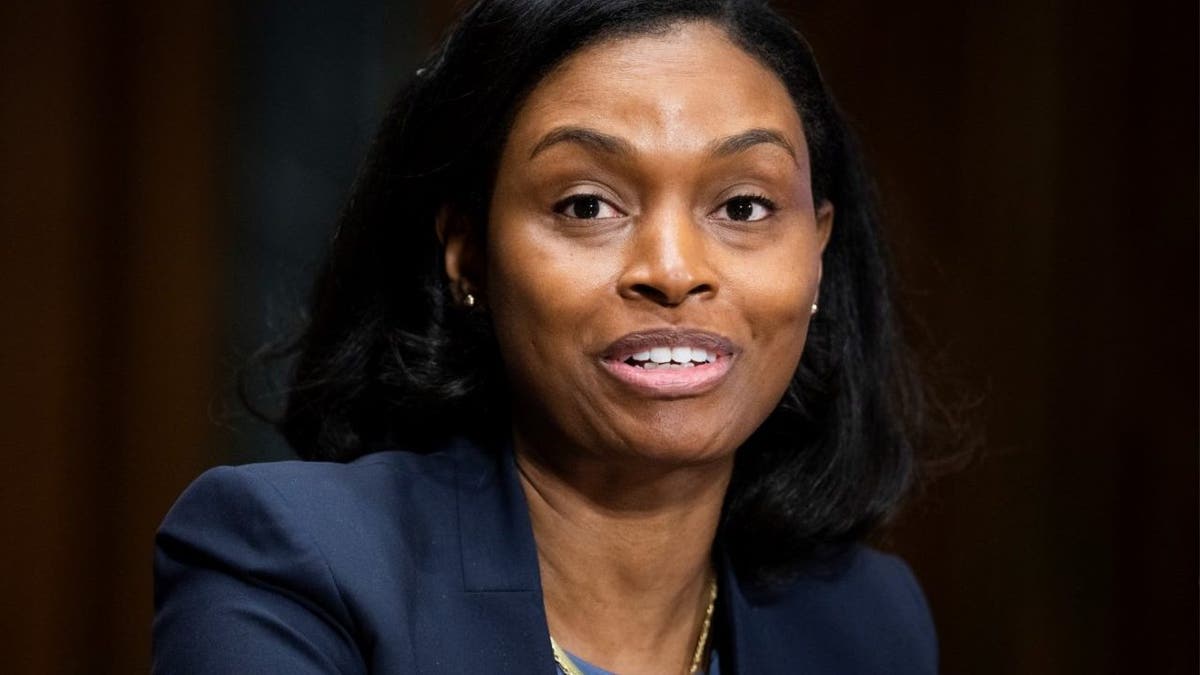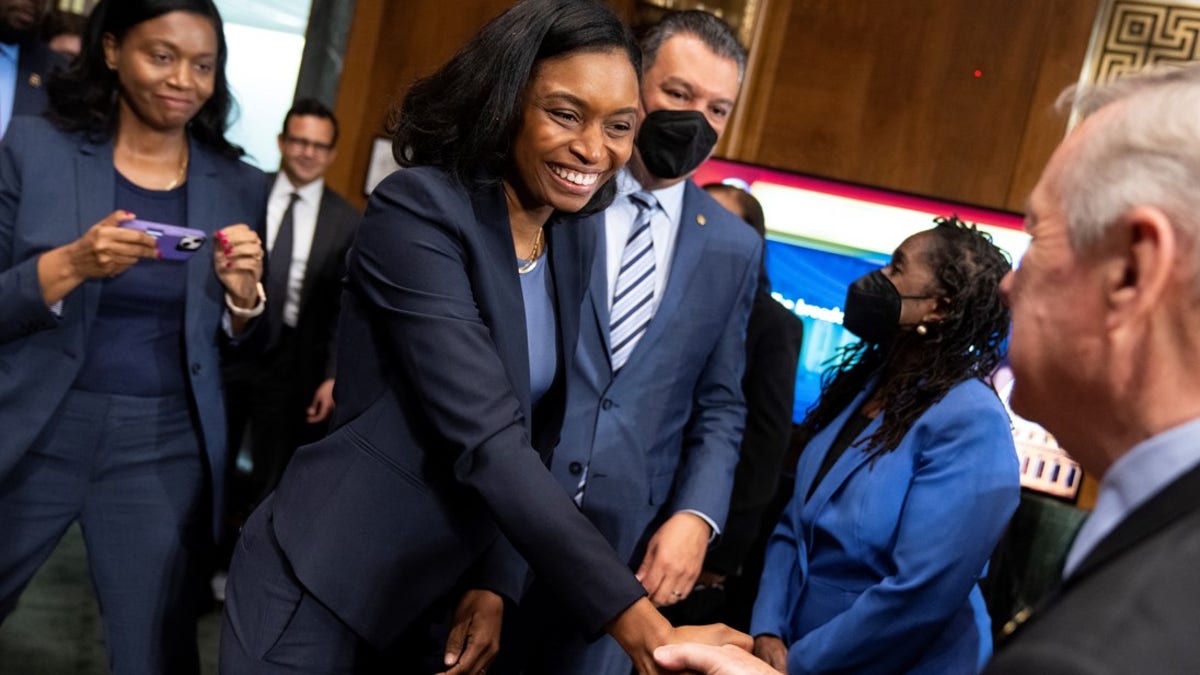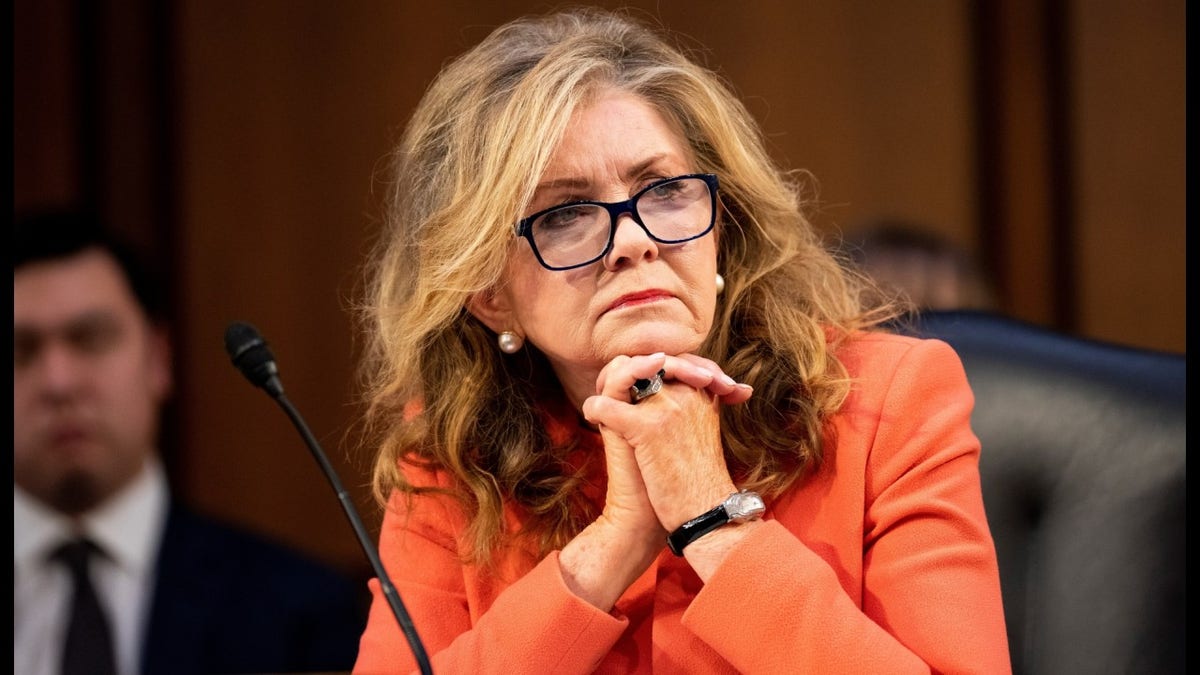Fox News Flash top headlines for May 18
Fox News Flash top headlines are here. Check out what's clicking on Foxnews.com.
President Biden’s nominee for the U.S. District Court for the Eastern District of New York said during a recently unearthed podcast that Republican-backed policies like voter ID laws and the U.S.-Mexico border wall are rooted in White supremacy.
Biden announced Natasha Merle’s nomination along with seven other federal judicial nominees in January, aiming to fulfill a "promise to ensure that the nation’s courts reflect the diversity that is one of our greatest assets as a country," the White House said at the time.

Natasha C. Merle, nominee to be U.S.. District Judge for the Eastern District of New York, testifies during her Senate Judiciary Committee confirmation hearing on judicial nominations in Dirksen Building on Wednesday, April 27, 2022. (Tom Williams/CQ-Roll Call, Inc via Getty Images)
Merle is the deputy director of litigation at the NAACP Legal Defense and Educational Fund (NAACP LDF) and has recently taught courses on racial justice and racial equity at Columbia University and New York University.
During an episode of "The Breach" podcast immediately following the 2017 Charlottesville car-ramming attack, Merle criticized Republicans who denounced racism at the now-infamous Unite the Right rally but continue to support what she considers racist policies.
"What we saw this past weekend in Charlottesville was horrible," Merle said at the time. "And many people and Republicans and legislatures have come out to denounce neo-Nazis and White supremacy, but I think lawmakers need to and should do more."
"You know, it’s inconsistent to denounce White supremacy but not repudiate voter ID laws, to not repudiate the Muslim ban, to not repudiate ‘the wall,’" she continued. "These are all things that support and are grounded in White supremacy. The voter ID bills disproportionately impact Black and Brown voters. They disproportionately prevent Black and Latino voters from voting. So you cannot say you are not for White supremacy and at the same time be for disenfranchising Black and Latino voters."

Natasha C. Merle, nominee to be U.S.. District Judge for the Eastern District of New York, greet Chairman Richard Durbin, D-Ill., after her Senate Judiciary Committee confirmation hearing on judicial nominations in Dirksen Building on Wednesday, April 27, 2022. (Tom Williams/CQ-Roll Call, Inc via Getty Images)
Merle also talked about systemic racism during a Martin Luther King Jr. Day speech to college students in January 2020 while discussing what kinds of cases the NAACP LDF chooses to take.
"Cases are usually brought to our attention by local community members or local contacts," she said at the Washington and Lee University School of Law. "From then, it obviously has to have a racial impact and a racial component, although I would say at a meta-level everything does in this country."
Earlier in the speech, Merle appeared to compare today's voter ID laws to "dogs and whips" being used to control minority populations.
"Decades after Bloody Sunday and the enactment of the Voting Rights Act, states no longer use explicit poll taxes, literacy tests, dogs and whips, but voter suppression continues," she said. "We cannot lose sight of states such as Alabama, Texas, Florida that have created new barriers to make voting harder, including by eliminating early voting, passing restrictive voter ID laws, and purging legal voters from their rolls – all of this happening with the implicit and sometimes explicit support of the Justice Department."
Merle was listed as a recommended judicial nominee on the website of People’s Parity Project, a nationwide "network of law students and new attorneys organizing to unrig the legal system and build a justice system that values people over profits." The organization, which has endorsed multiple progressive candidates who support "environmental justice" and "racial justice," set up a "Trump Accountability Team" that pushes for law students to harass law schools and law firms that hire Trump administration lawyers.
"Natasha Merle is a 2008 law school graduate who has devoted her career to public service, most recently as Deputy Director of Litigation at LDF," People's Parity Project tweeted in Jan. 2022. "In a sea of fantastic nominees today, Natasha stands out. We can’t wait to see Judge Merle on the bench!"
Merle’s nomination is currently pending before the Senate Judiciary Committee. A hearing on her nomination was held on April 27, when she was grilled by Republican senators about her past statements on race.
Marsha Blackburn, R-Tenn., asked Merle about her comments on "The Breach" podcast and whether she still believes "policy proposals such as voter ID requirements and a southern border wall are based on white supremacy?"
"The Supreme Court held in Crawford v. Marion County Election Board, 553 U.S. 181 (2008) that voter identification requirements can be constitutionally permissible," Merle responded. "Border security policies present important questions in the purview of policy makers, not the judicial branch. If confirmed as a district court judge, I would have no role in making policy. I would fairly and impartially apply Supreme Court and Second Circuit precedent to the facts of the case before me."

Sen. Marsha Blackburn, R-Tenn., listens to senators opening statements during the confirmation hearing for Judge Ketanji Brown Jackson, President Bidens nominee for Associate Justice to the Supreme Court, on Monday, March 21, 2022. (Bill Clark/CQ-Roll Call, Inc via Getty Images)
Sen. Chuck Grassley, R-Iowa, also asked Merle to defend her MLK Day speech during the hearing, citing a quote in which Merle said her goal is achieving "systemic reform that will lead to racial equality."
"What role do you believe that, as a federal judge, you would have in addressing systemic racial discrimination?" Grassley asked.
Merle responded that "the question of whether systemic racial discrimination exists, and what if anything should be done to address it, is in the purview of policy makers, not the judicial branch."
CLICK HERE TO GET THE FOX NEWS APP
"If confirmed as a district court judge and a case of race-based discrimination or racial bias comes before me, I would fairly and impartially apply the precedent of the Supreme Court and Second Circuit to the facts established in the record of the case," Merle said.
The White House did not immediately respond to Fox News Digital’s request for comment.














































